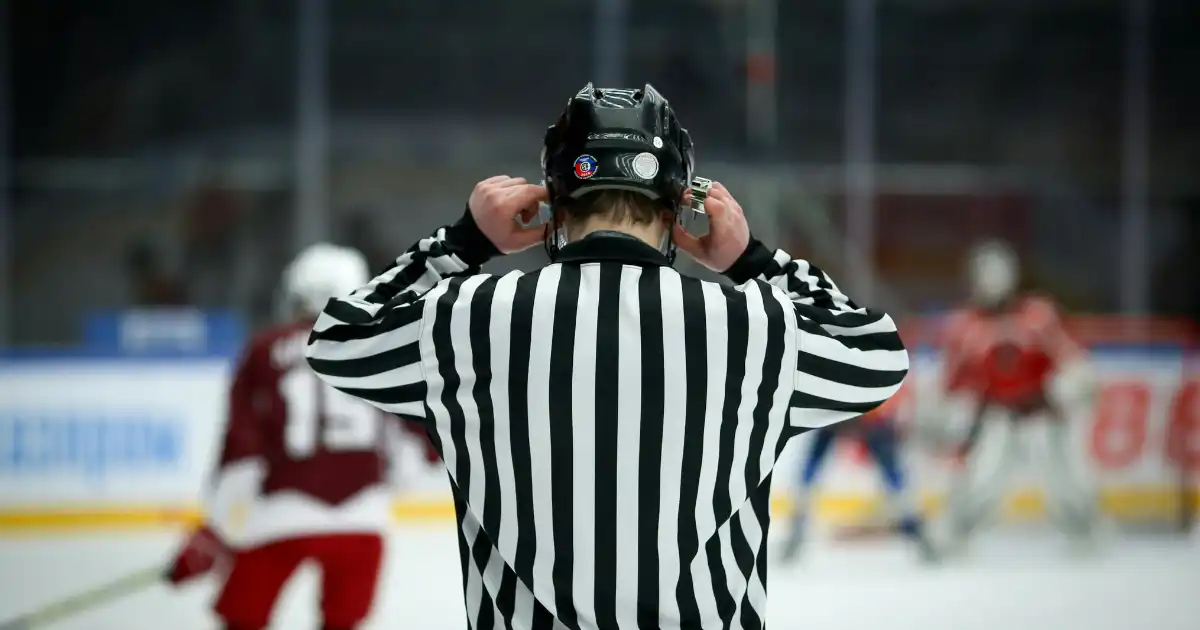Hockey is one of the fastest and most exciting sports in the world, with players flying up and down the ice, making quick passes, and firing off blistering shots. But for all the chaos and energy on the rink, there’s a group of people working hard to make sure everything stays fair and under control: the referees and linesmen. Without them, hockey wouldn’t just be unorganized—it could be outright dangerous. Let’s break down what these officials do, what they’re looking for during the game, and why they’re so important to the sport we all love.
Referees vs. Linesmen: Who Does What?
First off, it’s important to know that referees and linesmen each have different jobs during a hockey game, even though they’re all there to enforce the rules.
Referees are the ones who call penalties and make the big decisions. You’ll notice them because they wear orange armbands on their sleeves. They’re responsible for watching the overall flow of the game and stepping in when players break the rules. Whether it’s a high stick, a tripping call, or a fight that’s getting out of hand, the referees are the ones who blow the whistle and sort it out. They also review controversial plays, like whether a puck crossed the goal line or if a player interfered with the goalie.
Linesmen, on the other hand, focus more on the boundaries of the game. They’re the ones who call offside and icing, making sure that the puck is played legally within the rink’s zones. They also oversee faceoffs and step in to break up fights when they start to get too heated. While they don’t call most penalties, they can make calls for things like too many men on the ice.
Together, referees and linesmen work as a team to keep the game running smoothly and fairly.
What Are They Watching For?
It’s no small task to officiate a hockey game. The action moves fast—sometimes too fast for even fans to follow—so officials have to stay sharp and constantly adjust their positioning to get the best view of the play. Here are a few of the key things they’re watching for:
1. Penalties
Referees are on the lookout for anything that goes against the rules of fair play. Some of the most common penalties include:
• Tripping: When a player uses their stick, body, or leg to knock another player off balance.
• Slashing: A hard, unnecessary swing of the stick at an opponent.
• Interference: Blocking or impeding a player who doesn’t have the puck.
• Hooking: Using the stick to slow down or hold an opponent.
Referees also keep an eye on dangerous behavior like boarding, where a player hits someone from behind into the boards, or charging, which involves taking too many strides before delivering a hit. These kinds of penalties can result in harsher consequences, like major penalties or even suspensions.
2. Offside and Icing
Linesmen spend a lot of time focused on the puck and its relationship to the blue lines and red line. For example:
• Offside: This happens when a player crosses the opponent’s blue line before the puck does. It might seem like a small thing, but it prevents players from “cherry-picking” or camping out in the offensive zone for an easy scoring chance.
• Icing: This is called when a team shoots the puck from their side of the red line all the way past the opponent’s goal line, without it being touched. Icing ensures that teams can’t just fling the puck down the ice to relieve pressure.
3. Faceoffs
Every faceoff has to be fair, which is where the linesmen step in. They watch the players’ sticks, ensuring nobody jumps the gun or cheats by reaching across the circle before the puck is dropped.
4. Player Safety
Above all, officials are there to protect the players. They monitor hits, stick usage, and any other behavior that might lead to injuries. If tempers flare and a fight breaks out, the officials are there to break it up and make sure things don’t get out of hand.
The Challenges of the Job
Officiating a hockey game isn’t easy. Referees and linesmen are often skating just as much as the players, and they don’t get breaks between shifts. They need to stay mentally and physically sharp for the entire game, which can be tough when the action gets heated.
On top of that, they face constant criticism. Fans, players, and coaches are quick to voice their displeasure when they think a call doesn’t go their way. Even when officials make the right call, someone is always unhappy. It takes a thick skin and a lot of professionalism to handle the pressure and stay focused on the job.
Why Officials Matter
So why are referees and linesmen so important to hockey? Because without them, the game would lose its integrity. Their job is to make sure the game is fair for everyone. They also keep the game flowing, knowing when to let minor infractions slide to keep the rhythm of play intact and when to blow the whistle to maintain order.
Officials are the unsung heroes of hockey. They don’t score goals or make highlight-reel saves, but their work behind the scenes ensures that every game is played with respect, fairness, and safety. The next time you’re at a game, take a moment to appreciate the people in stripes who make it all possible. Without them, the game we love wouldn’t be the same.

